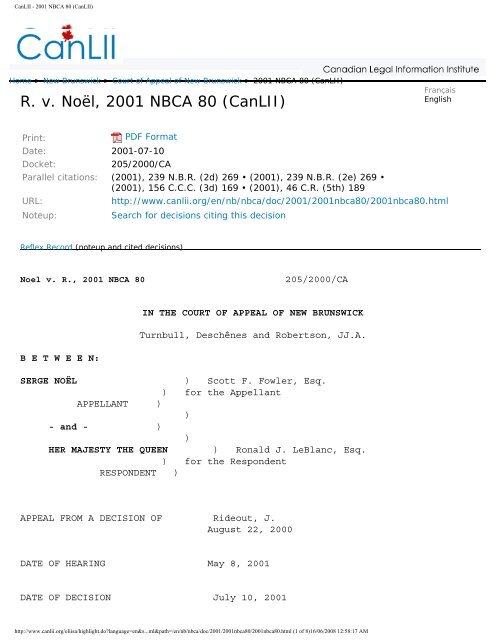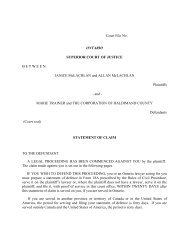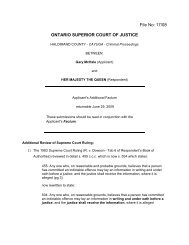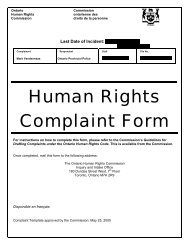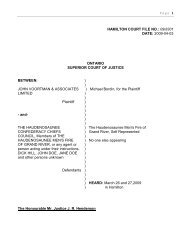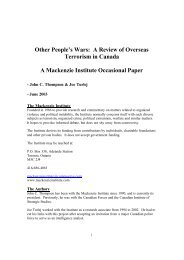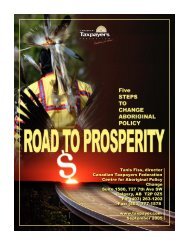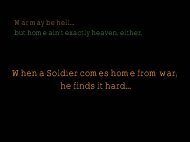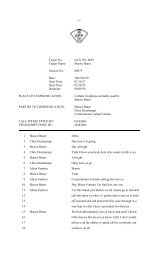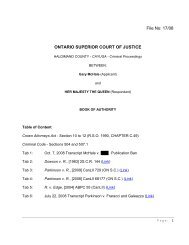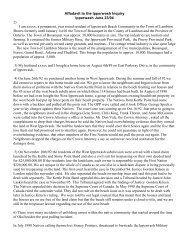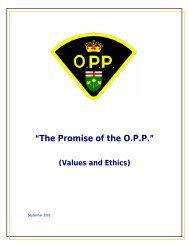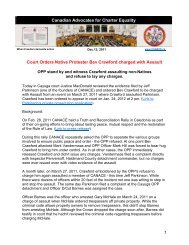1-NoelvR-2001nbca80 - Caledonia Wake Up Call
1-NoelvR-2001nbca80 - Caledonia Wake Up Call
1-NoelvR-2001nbca80 - Caledonia Wake Up Call
- No tags were found...
You also want an ePaper? Increase the reach of your titles
YUMPU automatically turns print PDFs into web optimized ePapers that Google loves.
CanLII - 2001 NBCA 80 (CanLII)Home > New Brunswick > Court of Appeal of New Brunswick > 2001 NBCA 80 (CanLII)R. v. Noël, 2001 NBCA 80 (CanLII)FrançaisEnglishPrint: PDF FormatDate: 2001-07-10Docket:205/2000/CAParallel citations: (2001), 239 N.B.R. (2d) 269 • (2001), 239 N.B.R. (2e) 269 •(2001), 156 C.C.C. (3d) 169 • (2001), 46 C.R. (5th) 189URL:http://www.canlii.org/en/nb/nbca/doc/2001/<strong>2001nbca80</strong>/<strong>2001nbca80</strong>.htmlNoteup:Search for decisions citing this decisionReflex Record (noteup and cited decisions)Noel v. R., 2001 NBCA 80205/2000/CAIN THE COURT OF APPEAL OF NEW BRUNSWICKTurnbull, Deschênes and Robertson, JJ.A.B E T W E E N:SERGE NOËL ) Scott F. Fowler, Esq.) for the AppellantAPPELLANT ))- and - ))HER MAJESTY THE QUEEN ) Ronald J. LeBlanc, Esq.) for the RespondentRESPONDENT )APPEAL FROM A DECISION OF Rideout, J.August 22, 2000DATE OF HEARING May 8, 2001DATE OF DECISION July 10, 2001http://www.canlii.org/eliisa/highlight.do?language=en&s...ml&path=/en/nb/nbca/doc/2001/<strong>2001nbca80</strong>/<strong>2001nbca80</strong>.html (1 of 8)16/06/2008 12:58:17 AM
CanLII - 2001 NBCA 80 (CanLII)REASONS FOR JUDGMENT BYDeschênes, J.A.CONCURRED IN BYTurnbull, J.A.and Robertson, J.A.THE COURTThe appeal is dismissed and it is ordered that a conviction forextortion under s. 346(1.1)(b) of the Criminal Code be entered against theappellant in lieu of the conviction for "attempted extortion" entered by thetrial judge. The appellant shall forthwith surrender himself to the Codiacdetachment of the RCMP to serve the sentence imposed on him by the sentencingjudge.DESCHÊNES, J.A.[1] The appellant appeals his conviction of "attemptedextortion" pursuant to s. 346(1.1)(b) of the Criminal Code of Canada.[2] The grounds of appeal are as follows:(1) The Trial Judge erred in finding the Appellant guilty of anoffence he was not charged with and that was not supported by theevidence; and(2) The Trial Judge erred in law by apparently amending theindictment.[3] The events upon which the trial judge relied to convictthe appellant essentially took place on February 17, 2000 when the appellantvisited Ms. Nadine Kandalaft-Johnson and Ms. Ouellette-Johnson at theirresidence in Dieppe, N.B. The purpose of the visit was to discuss a drugdebt owed to the appellant by Sacha Kandalaft, Ms. Ouellette-Johnson's son.[4] After considering the evidence as a whole, the trialjudge made the following findings:I am satisfied that there was no physical violence on the times allegedin the indictment. As mentioned earlier, there were two other incidentsof physical violence but they are unrelated to this matter. However, I amalso satisfied beyond a reasonable doubt that there were threats andmenaces on February 17 th 2000 in Dieppe, New Brunswick. I am satisfiedthat Serge Noël made these -- those threats and menaces on that day. Ibelieve Nadine Kandalaft-Johnson and Ms. Ouellette-Johnson when they saythey felt threatened and that Serge Noël did say in effect you don't knowwho you are dealing with and he was going to punch Sacha's lights out. Heswore this on his mother's heart. This could only be for the purpose ofcollecting the money.http://www.canlii.org/eliisa/highlight.do?language=en&s...ml&path=/en/nb/nbca/doc/2001/<strong>2001nbca80</strong>/<strong>2001nbca80</strong>.html (2 of 8)16/06/2008 12:58:17 AM
CanLII - 2001 NBCA 80 (CanLII)I am satisfied that other incidents which occurred against NicoleOuellette-Johnson at or near the Town of Dieppe during the time period inquestion also constitute threats or menaces. And I'm referring to thephone calls and the other visits. The problem I face in this matter isthe issue raised by Defense counsel concerning the wording of theindictment. No money exchanged hands on these occasions of threat ormenace. So, Serge Noël did not extort anything on those occasions.Therefore, according to Defense counsel, the Crown did not prove itscase. As alluded to earlier, I do not believe the Crown has proved itscase beyond a reasonable doubt with respect to Sacha Kandalaft. I do notbelieve many of the things that he had to say and I therefore can'tconvict because I cannot -- I still have reasonable doubts with respectto the charges relating to Sacha Kandalaft.However, based on the authorities and on the evidence, I believe theCrown has proved beyond a reasonable doubt that Serge Noël attempted toextort money from Ms. Nicole Ouellette- Johnson. The question mark iswhether the indictment and the Criminal Code permits such a finding of[guilt]. Section 346(1) refers to induces or attempts to induce. AndSection 660 of the Code says, "Where the complete commission of anoffence charge is not proved but the evidence establishes an attempt tocommit the offence, the accused may be convicted of the attempt. Ibelieve that that is the case.Mr. Noël, would you please stand?Based on all of the evidence I have heard, I am satisfied beyond areasonable doubt that you are guilty of attempted extortion, contrary toSection 346(1.1)(b) as against Ms. Ouellette-Johnson.[5] The trial judge concluded that the appellant had madethreats to use violence against Ms. Ouellette-Johnson's son, SachaKandalaft, on February 17 th , 2000 in Dieppe, New Brunswick. He alsoconcluded that such threats had been made for the purpose of collecting adrug debt owed by her son to the appellant and that the appellant's intentwas to obtain payment of the drug debt from Ms. Ouellette-Johnson.[6] In my view, there was ample evidence to support thefindings of fact just recited and this Court ought not to interfere.There was no evidence, however, that any money had exchanged hands on orafter February 17 th , 2000 as a result of the threats of violence made onthat date.[7] Considering that the indictment alleges that theappellant did induce Sacha and Ms. Ouellette-Johnson by violence and threatsof violence to pay the appellant the sum of $4,000, the trial judge had todeal with the appellant's argument that the respondent Crown had not provedits case as the appellant did not extort anything on that occasion. Thetrial judge concluded that the appellant had "attempted to extort" moneyfrom Ms. Ouellette-Johnson and after referring to sections 346 and 660 ofthe Criminal Code, found the appellant guilty of "attempted extortion"contrary to section 346 (1.1)(b).Analysis and Decisionhttp://www.canlii.org/eliisa/highlight.do?language=en&s...ml&path=/en/nb/nbca/doc/2001/<strong>2001nbca80</strong>/<strong>2001nbca80</strong>.html (3 of 8)16/06/2008 12:58:17 AM
CanLII - 2001 NBCA 80 (CanLII)[8] Sections 346 and 660 of the Criminal Code read asfollows:346.(1) Every one commits extortion who, without reasonable justificationor excuse and with intent to obtain anything, by threats, accusations,menaces or violence induces or attempts to induce any person, whether ornot he is the person threatened, accused or menaced or to whom violenceis shown, to do anything or cause anything to be done.(1.1) Every person who commits extortion is guilty of an indictableoffence and liable(a) where a firearm is used in the commission of the offence, toimprisonment for life and to a minimum punishment of imprisonment for aterm of four years; and(b) in any other case, to imprisonment for life.660. Where the complete commission of an offence charged is not provedbut the evidence establishes an attempt to commit the offence, theaccused may be convicted of the attempt....[9] As can be seen, the offence of extortion under section346 can be made out if anyone induces or attempts to induce. In otherwords, the trial judge could have found the appellant guilty of extortionunder s. 346 of the Code despite the fact that neither Ms. Ouellette-Johnson nor her son Sacha had paid any money as a result of the threat ofviolence made on February 17, 2000. In that context, the conclusion by thetrial judge that the appellant was guilty of "attempted extortion" under s.346 was merely a reflection of his conclusion that the appellant hadattempted to induce payment of the drug debt with no result. In my view,there was no need for the trial judge to refer to s.660 of the Code to findthe appellant guilty.[10] In the Supreme Court of Canada case of R. v.Natarelli, 1967 CanLII 11 (S.C.C.), [1967] S.C.R. 539 at pages 545-46, JusticeCartwright, writing on behalf of a unanimous Court, discusses the essentialelements of the offense of extortion under section 291 (now, in substance,section 346) of the Code as follows:When it is proved that threats have been made for the making of whichthere could be no justification or excuse, that the threats were madewith intent to gain something and were calculated to induce the personthreatened to do something, the commission of the crime defined in s. 291is established, and it is unnecessary to inquire whether the personmaking the threats had a lawful right to the thing demanded orentertained an honest belief that he had such a right; that inquiry wouldbe necessary only if the threats were such that there could be reasonablejustification or excuse for making them.Speaking generally, the essential ingredients of an offence under s. 291http://www.canlii.org/eliisa/highlight.do?language=en&s...ml&path=/en/nb/nbca/doc/2001/<strong>2001nbca80</strong>/<strong>2001nbca80</strong>.html (4 of 8)16/06/2008 12:58:17 AM
CanLII - 2001 NBCA 80 (CanLII)are, (i) that the accused has used threats, (ii) that he has done so withthe intention of obtaining something by the use of threats; (whatevermeaning be given to the word "extort" the word "gain" as used in thesection is simply the equivalent of "obtain") and, (iii) that either theuse of the threats or the making of the demand for the thing sought to beobtained was without reasonable justification or excuse; (the question onthis aspect of the matter is not whether one item in the accused's courseof conduct, if considered in isolation, might be said to be justifiableor excusable but rather whether his course of conduct considered in itsentirety was without justification or excuse).[11] In R. v. Davis (G.N.) reflex, (1998), 159 Nfld. & P.E.I.R., 273, affirmed by the Supreme Court of Canada at 1999 CanLII 638 (S.C.C.), [1999] 3S.C.R 759, the following comments at para. 52 are apposite:The question that is left, therefore, is whether, as a matter of law, onthe evidence of P.V.B., which was properly accepted by the trial judge,there was a basis for concluding that the offence of extortion had beenestablished. Subsection 346(1) of the Criminal Code provides:It is to be noted that the offence of extortion includes within it thenotion of an attempt. It essentially involves four elements: (i) athreat (no accusations, menaces or violence are involved in this case);(ii) an intent to obtain "anything" by means of the threat; (iii) aninducement or attempted inducement; and (iv) the absence of reasonablejustification or excuse for the use of the threat and the making of theinducement....[12] Finally, in R. v. Perera (1991), 5 B.C.A.C. 302;[1991] B.C.J. No. 2999, online: QL (BCJ), the issue raised by the appellantin this case is squarely dealt with. In that case, the accused was indictedon a charge that he, without reasonable justification or excuse and withintent to obtain money by threats, did induce the complainant to pay moneyto the accused. The complainant had responded to the threats by going to thepolice who subsequently taped incriminating phone calls and then arrestedthe accused. As in this case, the argument was advanced that the essentialelements of the indictment had not been proved as there was, in fact, noinducement as alleged in the indictment as the money was never paid. Afterhaving referred to section 346 of the Criminal Code, the British ColumbiaCourt of Appeal stated:For convenience I will deal with those issues in the order in which Ihave set them out. The first issue was stated in these words:1. THAT the Appellant did not "induce" the victim to pay $4000. to himand/or that no monies were paid to him in fact.In order to consider this issue it is necessary to look at the specificterms of the section of the Criminal Code under which the appellant wascharged. It is s. 346:http://www.canlii.org/eliisa/highlight.do?language=en&s...ml&path=/en/nb/nbca/doc/2001/<strong>2001nbca80</strong>/<strong>2001nbca80</strong>.html (5 of 8)16/06/2008 12:58:17 AM
CanLII - 2001 NBCA 80 (CanLII)...The argument that was made by the appellant in relation to this ground ofappeal was that no act of the appellant "induced" any conduct of thecomplainant. She went immediately to the police and thereafter theconduct was as suggested by the police. In particular, the parting withthe money orders was not induced by the appellant.Secondly, it was said that an amount of money was specified in theindictment, though that is a particularization of the terms of thesection, and that the money orders used were not genuine money orders andso the terms of the indictment in relation to the payment of money werenot proven.In response to these arguments counsel for the Crown said this: First,that it was money that was paid; Second, that the indictment could beamended with respect to whether it was money or not; Third, that in anyevent it was an attempt to induce the payment of that amount of money.In relation to the attempt point, Crown Counsel argued that there ispower to convict of an attempt to commit the offence charged without anyamendment to the indictment, and, as a second aspect of the argumentunder attempt, that there was the power to amend the indictment tospecify the attempt and so to correspond to the evidence.The section of the Criminal Code on extortion, s. 346 is one of the veryfew sections in the Code which makes an attempt to commit the offence anoffence in itself. The attempt is itself specified in the section. Otherexamples are uttering in s. 368 and a way of committing assault in s. 261(1)(b).Counsel for the Crown referred to sections which he suggested the Courtmight consider relevant to his arguments. He referred particularly to s.24(1), s. 660, s. 662(1), s. 686(1)(b)(i), and s. 683(l)(g). My brotherMr. Justice Toy referred also to s. 463(b).In my opinion, it is not necessary to set out and analyze the relevanceof those sections, though they all indicate a pattern which permits someprocedural flexibility in the interests of justice so long as there is noprejudice to the accused.In this case I rely on s. 683(1)(g). It is a comparatively new sectionand there is no reason to trammel it with pre-existing jurisprudence thatit was intended to overcome. It specifically gives power to the Court ofAppeal to amend an indictment unless the Court is of the opinion that theaccused has been misled or prejudiced in his defence or in his appeal.The specific amendment that I would make to the indictment is that Iwould add the words "attempt to" before "induce". In my opinion, in everycriminal charge the accused must understand that not only the offencespecified in the count requires a defence but any attempt to commit theoffence as specified in the charge, if it is proven to have been coupledwith acts to carry out the commission of the offence, puts the accused inJeopardy on the very same count in relation to a conviction for anattempt.In my opinion, in those circumstances it cannot be said that there wasany misleading of the appellant or any prejudice to him in his defencethrough making the amendment that I have set out to the indictment.[13] Returning to the case under appeal, the appellant inhttp://www.canlii.org/eliisa/highlight.do?language=en&s...ml&path=/en/nb/nbca/doc/2001/<strong>2001nbca80</strong>/<strong>2001nbca80</strong>.html (6 of 8)16/06/2008 12:58:17 AM
CanLII - 2001 NBCA 80 (CanLII)his supplemental submission relied upon R. v. Clemens Blair Ketchen (1986),16 W.C.B. 344. The accused had been charged with extortion and was allegedto have induced one Mr. Bovey by threats of death to pay a sum of $250.00out of a total amount due of $1,250.00 but the evidence disclosed only anattempt to do so. Mr. Bovey and the accused were involved in a motor vehicleaccident while Mr. Bovey was impaired. They agreed on what the trial judgeconsidered inflated damages and that the incident would not be reported tothe police. The accused received $250.00 at the scene and some time afterhaving made the first payment, the accused took him to the back of hisvehicle, opened the trunk and showed Mr. Bovey the stock of a gun andthreatened to kill him if the balance owed was not paid as agreed. Anotherthreat was made before the second payment became due but Mr. Bovey calledthe police and a second payment was never made.[14] The indictment alleged that the accused, "with intentto extort the sum of $1,250.00 in monies more or less, did induce PeterBovey by threats of death to pay the said Clemens Blair Ketchen the sum of$250.00." The trial judge found that the evidence simply did not establish,as alleged in the indictment, that the accused had induced payment of the$250.00 by threats. On the contrary, the evidence clearly established thatMr. Bovey had paid the first installment of $250.00 to the accused wellbefore the accused issued the threat. The trial judge then commented:It was submitted by the Crown Attorney that it was open to me, on thebasis of the evidence, to find, applying Section 587 of the CriminalCode, that the commission of the offence charged has not been proved, butthat the evidence established an attempt to commit the offence. It is,therefore, submitted that Mr. Ketchen should be convicted of the offenceof attempting to extort the money from Mr. Bovey. In my view, because ofthe unique wording of Section 305(1), this position is not available tothe Crown. It is to be observed that Section 305(1) contains languagewhich provides for the commission of the offence of extortion inalternative ways. I am referring to the words "induces or attempts toinduce any person." It was open to the Crown to charge Mr. Ketchen withattempting to induce Mr. Bovey to make certain payments by way of certainthreats. However, the Crown elected not to do that. In my view,therefore, because of this unique wording to Section 305(1), even if theevidence were to support an attempt, it would not be open for the Courtto convict.[15] In my view, Ketchen is distinguishable from this casemainly because there was simply no evidence in Ketchen to support a findingof an attempt to induce Mr. Bovey by the use of a threat to pay over thefirst installment of $250.00. In addition, the indictment specificallyalleged that the appellant had induced Mr. Bovey by threats of death to paythe appellant the sum of $250.00 out of the total amount due and the casehad obviously been defended on the basis of what the trial judge referred toas an "essential averment in the indictment".[16] In the case argued before us, there was ample evidenceto support the trial judge's conclusion that the appellant attempted toinduce Ms. Ouellette-Johnson topay her son's drug debt by threatening to cause him bodily harm and thehttp://www.canlii.org/eliisa/highlight.do?language=en&s...ml&path=/en/nb/nbca/doc/2001/<strong>2001nbca80</strong>/<strong>2001nbca80</strong>.html (7 of 8)16/06/2008 12:58:17 AM
CanLII - 2001 NBCA 80 (CanLII)indictment was drafted in a manner which could not prejudice the accused in thepreparation of his defense for the reasons mentioned in Perera. Under suchcircumstances, the commission of the crime under s. 346 is established andresorting to s. 660 of the Criminal Code is not an option as the offence ofextortion is complete.[17] In my view, the trial judge could and should haveamended the indictment to add the words "attempt to" before "induce" inorder to have it conform to the evidence upon which he relied to convict theappellant under s.346 (1.1)(b). This Court has the power to amend theindictment under s.683(1)(g) of the Criminal Code where it considers it inthe interest of justice unless it is of the opinion that the accused hasbeen misled or prejudiced in his defence or appeal. In my view, it is in theinterest of justice to do so in this case and such an amendment does notprejudice or mislead the accused for the reasons advanced in Perera. Theindictment is amended to add the words "attempt to" before the word "induce".[18] For these reasons, I would dismiss the appeal andorder that a conviction for extortion under s. 346(1.1)(b) of the CriminalCode be entered against the appellant in lieu of the conviction for"attempted extortion" entered by the trial judge.[19] The appellant shall forthwith surrender himself to theCodiac detachment of the RCMP to serve the sentence imposed on him by thesentencing judge.WE CONCUR:_____________________________ALEXANDRE DESCHÊNES, J.A.______________________________WALLACE S. TURNBULL, J.A._______________________________JOSEPH T. ROBERTSON, J.A.Scope of Databases RSS Feeds Terms of Use Privacy Help Contact UsAboutby for the Federation of Law Societies of Canadahttp://www.canlii.org/eliisa/highlight.do?language=en&s...ml&path=/en/nb/nbca/doc/2001/<strong>2001nbca80</strong>/<strong>2001nbca80</strong>.html (8 of 8)16/06/2008 12:58:17 AM


